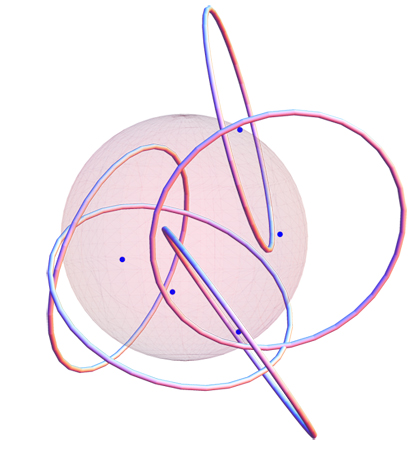Let $S$ be a sphere of unit radius. Let $C_n$ be a collection of unit-radius circles/rings whose centers are (uniformly distributed) random points in $S$, and which are oriented (tilted) randomly (again, uniformly).
Q1. As $n \to \infty$, does the probability that all the rings in $C_n$ are linked together in one component approach $1$?
By "linked together" I mean that if you pick up any one ring,
all the others are physically connected and would follow.
For example, below there are $n=5$ rings, four of which are
connected, but one (topmost) is not:
RandCircleLinks http://cs.smith.edu/~orourke/MathOverflow/RandCircleLinks.jpg
Q2. Same as Q1, but with $S$ a sphere of some (perhaps large) radius $r > 1$.
Q3. Same as Q1, except with $S$ an arbitrary convex body, e.g., a cube.
I feel the answer to Q1 should be Yes, but I am less certain of Q3. Exact computation of probabilities as a function of $n$ might be difficult, but I am hoping there are relatively simple arguments to settle these questions. Thanks for ideas!
Answered (1May13). The combination of Ori Gurel-Gurevich's and Benoît Kloeckner's postings constitute a rather complete answer, establishing that the answer to all my questions is Yes, even without the assumption that $S$ is convex. Thanks for the interest!
